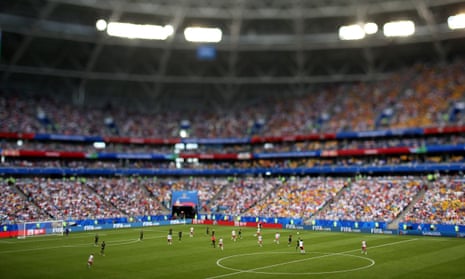Let’s not allow the uncertainty of results, the patriotic feeling football provokes or the increasing money generated by this fantastic industry to distract us from the evolution of the game itself, the play. Regressive tactics advance at greater speed than creative ones and the obsession with statistics contributes to that.
At this World Cup, more than ever before, we want to know everything with mathematical precision, even though football is beautiful when two and two don’t make four. Or when South Korea beat Germany, say.
We want calculations to be proven correct before the game has even started. Big data and mathematical projections are making their way on to the field of play to tell us things I don’t want to know. We love football for its imprecision, its moments of genius and its mistakes, when the ball bounces badly and the left-back plays terribly because he’s had a fight with his girlfriend before the game. And there’s no equation that can explain that.
Of course the data helps but in the world of play, like in art, we have to put a limit on it because these are realms of freedom. The big problem is that with every step we take towards “scientific certainties”, players lose a little more freedom. Freedom for what? To think. There’s a reason they’re the protagonists.
It’s worth clarifying, so that you know who’s talking to you here, that I love football more than I love a team, that I admire any given player more than the greatest manager, that the ball fascinates me as much as the “science” of the game. In fact, I think football is the opposite of technology precisely because of its exaggeratedly human condition: contradictory, primitive, emotional. So you’ll understand that I see VAR as an aberration, for example. If we want justice, let’s fight for it – but in real life, not on a football pitch. Football is a child of its time, of a moment, and that identity as a primitive game exempts it from the need to be all modern and cutting edge. Yes, I know: it’s a losing battle.
Anyway, let’s continue. For some time now, a silent battle has been fought between those who know about football because they played it and that taught them endless things – lots of ex-players don’t even know all that they know – and those who, while they know less, explain it better because university gave them knowledge and the tools of persuasion.
When football club directors are in a bind all they want is someone to lie to them offering a version of events that is optimistic and irrefutable, based on “scientific” evidence. (Speech marks are vitally important every time the word science is used applied to football.) The battle is being won by the educated. But a word of warning: we are underestimating, and risk losing, the huge amount of wisdom that exists on the side of those who don’t even know all that they know.
Johan Cruyff understood that well and always mistrusted intruders. I’m not talking about coaches who never played – there are too many brilliant cases for that – but the army of people getting close to the game with sophisticated ideas that appear to have the solution to every problem. Some are obsessed with the mind, others the body, still more with tactics. They forget that players are people who play. It’s very useful to integrate every element, but the main one continues to reside somewhere in their instinct.
An example: there are “revolutionary” advances (more speech marks) like using drones to film and analyse training sessions, allowing you to see what is happening from above. Daft and pointless, whichever way you look at it. But, careful, here’s the thing: the coach that doesn’t have a drone gets labelled old-fashioned even by the players themselves and that’s terrible if they want to stay in a job.
We know a lot. Like the fact that a player ran 12.345 kilometres. It’s an admirable figure, in athletic terms. But, did he run to help? To get in the way? To give the ball to a team-mate? Or to an opponent? To bring order? Chaos? As he ran, did he think? We need the context. If not, let’s leave the numbers for something else.
As I always liked this game when the ball is at a player’s feet, let’s analyse another stat: the one that says a player touched the ball 100 times and did so with a 95% success rate. Javier Mascherano was the player who touched the ball more times in a single game than anyone else in the group phase – more than 140 touches against Iceland. Did Mascherano play well? That’s another story. Because the players with the second- and third-most touches in that game were Argentina’s two centre-backs, a sign that the passes were routine, inoffensive, without purpose. They didn’t threaten the opponent, they didn’t break through lines. They didn’t fulfil the first rule of any attacking move: eliminate opponents. But analysing football through numbers rather than letters seems to comfort specialists, as if it offered incontestable evidence and thus certainty. There are players who are unmarked but keep running, presumably so that the kilometre count doesn’t make them look bad.
And where do the players stand in this evolution of the game? With every step, they become just another piece in the machinery. That requires discipline, responsibility, solidarity, sacrifice – all virtues found in a good citizen. As we continue on this path, intensity defeats the ability to pause, to slow down; passing defeats dribbling; predictability defeats trickery ... and on it goes. The coach wants control and that’s easier to achieve without the ball than with it, working on defensive movements rather than offensive ones, the ball stopped rather than in motion. As Antoine Griezmann said after the sad draw between France and Denmark: this is just the way it is.
